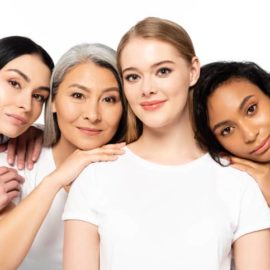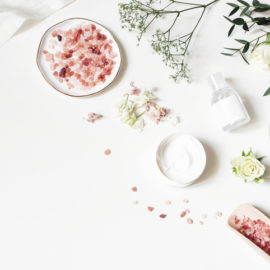During the coronavirus pandemic, there was a 28% daily trend increase in references to clean beauty and safety in the United States (Mintel, 2020). In light of the events, this is hardly surprising; health and safety concerns are more pronounced than ever before. Consumers are demanding greater transparency from governments and placing more trust in science. Naturally, this translates from public life into other spaces: consumers are also demanding greater transparency from the beauty industry. The label ‘clean’ is not enough – they are looking for holistic approaches to ethical beauty.
Clean beauty is heading towards greater transparency. Now, ‘free-from’ or ‘organic’ claims will not satisfy an acutely conscious consumer. Instead, consumers will look for natural ingredients, ethical sourcing, and scientific backing. From plant extracts to packaging, consumers want ethical beauty in-the-round. Here, we explore this push towards transparency and ethical beauty in a post-pandemic landscape.
Content
Natural ingredients, transparently sourced
A key trend that Mintel has observed in recent years is skepticism about the use of artificial ingredients and the drive towards natural products. This is because people want to feel connected to their external environment; according to further research, 75% of adults agree that they try to act in a way that is environmentally-friendly (Mintel, 2020).
In the wake of COVID-19, this tendency will become even more pronounced. Many people see the pandemic as a result of unethical practices and a lack of respect for the environment. Thus, they are scrutinizing brands’ eco-credentials more closely than ever. Beauty brands will need to work harder to convince consumers and they will need to go beyond ‘natural’ or ‘free-from’ labels. They need to be prepared that consumers will study their supply chains, seeking reassurance that plants and botanicals are sustainably cultivated.
A further ethical beauty standard that serves as an extension of the natural beauty trend is vegan and cruelty-free beauty. Considering the connection between COVID-19 and the wildlife trade, consumers are going plant-based. This trend was already big – The Body Shop sold over 3 million vegan products in the UK in 2018 alone – but it is set to gain pace post-pandemic (Mintel, 2018).
Safe formulas, backed by science
The push to natural has led to the rise of ‘clean’ label products. However, as part of the broader trend towards transparency, consumers don’t want to take your word for it – they want evidence. Sure enough, the COVID-19 outbreak has brought scientific expertise to the fore: society is looking to science for answers. In response, the natural beauty concept needs to evolve and brands should prioritize science and nature in equal measure.
This is especially the case as safety and hygiene become of increasing concern. Consumers want to know that products are safe to use long-term. Clean beauty will have to be more transparency-led and expert-driven, clearly communicating the hygiene, safety, and efficacy of extracts and synthesized ingredients.
Equally, science is a source of inspiration. When it comes to developing a fully ethical supply chain, it’s scientific innovations that find ways to make every aspect of creating and marketing a product more sustainable. For instance, brands should look to science to develop biodegradable packaging solutions. Equally, in regard to safety, consumers will also seek out touchless applications, with opportunities for brands to position innovative formats to allow for more hygienic ways to apply skin care.
Caring for people and the planet
The ethical beauty movement doesn’t stop at product; it’s about people too. In terms of brand image, you only have to look at the stir caused by companies flouting safety standards during the pandemic to see the damage neglecting ethical employment practices can do. In the new normal, consumers want brands to be as socially responsible as they are environmentally sound. In the USA, 65% of younger millennials believe brands should speak up on social issues (Mintel, 2020).
This care for people and communities needs to extend to product development and marketing. Consumers want inclusive beauty that caters to all skin tones, cultures, genders, and abilities. Amongst millennials, 64% want to see beauty brands showcase more diversity – and brands are responding (Mintel, 2020). For instance, a major color cosmetics brand has recently appointed blind vlogger Lucy Edwards as an ambassador.
Upholding ethical beauty
Inspired by nature and science in equal measure, Provital develops natural and clean actives that work. Provital’s ingredients are certified by standards authorities like COSMOS and ISO to clearly indicate to our customers that their development was sustainable, natural, and safe. That is why Provital seeks full transparency across the supply chain. But it doesn’t stop there – the company cares for people and the planet. Through participation in key social responsibility projects, Provital ensures that everyone can benefit from the Earth’s rich resources. This is because ethical beauty is more than a label – it’s a philosophy.
No comments yet
There are no comments on this post yet.





Leave a comment